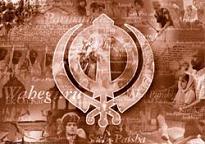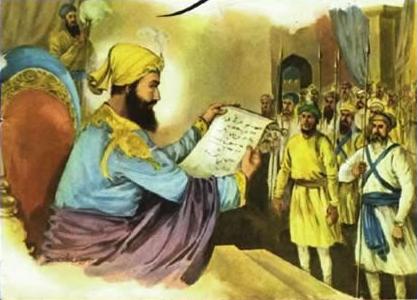
Sikh Missionary Society U.K. (Regd)
10, Featherstone Road.
Southall, Middx, U.K. UB2 5AA
Tel: +44 020 8574
1902
Fax: +44 020 8574
1912
Reg Charity No: 262404
 |
Sikh Missionary Society U.K. (Regd)
10, Featherstone Road.
Southall, Middx, U.K. UB2 5AA
Tel: +44 020 8574
1902
Fax: +44 020 8574
1912
Reg Charity No: 262404
|
||
|---|---|---|---|
|
|
|||
The Epistle of Victory
"O God, grant me this boon;It was the 29th of December, 1704. The Guru took leave of Rai Kalha who presented him good horses and arms. The Guru admired Rai Kalha for the services he had rendered and the affections he had shown. The Guru bestowed on him his own sword as a token of remembrance, and accompanied by three Sikhs, moved on. They were wearing clothes dyed blue. They passed through many villages and finally reached Dina in District Ferozepur.
May I never turn away from good deeds,
Nor when fighting adversary may I ever be afraid.
But with a firm resolution may I achieve victory,
Over my mind may I have complete control.
O Lord, that is what I crave in thy name.
When, finally the time comes for me to rest,
May I die in the thick of the battle."
(Guru Gobind Singh)
The people everywhere heard that the Guru had been killed at Chamkaur. The truth began to be known to them when the Guru reached Dina. The news that the Guru was safe, first reached the villages of the Malwa (area south of River Sutlej). It gradually spread to other parts of the country. This shocked and puzzled Nawab Wazir Khan, the Governor of Sirhind. The Guru stayed at Dina for a considerable time organizing the Sikhs of Malwa. He kept himself fully informed about Wazir Khan's plans.

"Na Zebad tura nam Aurangzeb
Keh Aurangzeba na Baid Fareb.
"The name Aurangzeb does not become you because it means a fair and just person."In reply to the Emperor's accusation regarding the use of the sword by a saint like Guru Gobind Singh, he replied:
"Chu kar az hama heelte dargujasht,
Halal ast burden ba shamsheer daste."
"When there's no other course open to man, it is only righteous to unsheathe the sword."The Guru referred to the perjury of Aurangzeb at the siege of Anandpur and discreetly pointed out to him that he was neither a true Muslim nor a good human being.
"Na iman prasti na auza e din,
Na sahib shinashi na Mohammad Yakin,
Na kasme Quran sad kunad akhtiar,
Muran katra nayad azo aitbar"
"You have no regard for religion nor are your actions guided by religion. Neither do you recognise God nor do you have firm faith in Mohammad. Even if you vow a hundred times on the holy Quran, I would not trust you an iota."The Guru referred to the incident at Chamkaur and ascribed his escape to the mercy of God, otherwise how could only forty hungry men face the thousands?
"Khasam dushmani gar hazarawrad,
Na yak mu-e o bazar awrad."
"Gursna che kar-e kunad chihal nar,
Je dah lake bar ayad bare be Khabar."
"The enemy may practise enmity in a thousand ways, but he will not succeed in hurting even the hair of the head of him whom God protector."The Guru then mentioned the atrocities perpetrated on his innocent sons at Sirhind and Chamkaur and remarked:
"How could forty men with hungry stomachs achieve success when thousands fell upon them unawares?"
"Chiha shud ke chun bachgan kushta char,
Keh baqi bimand ast pachida mar."
"Cheh mardi keh akhgar khamoshan kuni,
Keh atash dameran Ferozan kuni"
"What if my four sons are killed when I, the coiled snake, still survive. What bravery is it to extinguish a few sparks of life when you have set an ever raging fire ablaze."The Guru pointed out that Aurangzeb could not escape his wrath and that if he wanted to measure his strength with the Guru there was no need to have thousands of innocent soldiers kills on both sides. He challenged him to a duel.
"Ba maiden be a khud ba tegho tabar,
Makun khalaq khalaq zero zabar."
"Azan pasdran arsani karzar,
Man aim Juridah tun ba do sawar"
"Come in the battlefield yourself dressed with a sword and other arms. Why should God's creation be destroyed without reason? I will come in the battlefield alone and you may bring two of your choicest warriors."In reply to Emperor's invitation, the Guru replied that, since he had no trust in him, it would be best if this time the Emperor trusted him and came to Dina Kangar to meet the Guru.
"Hazuri na aiam na ee ra shavam,
Agar shah bakhahad na anja ravam,
Keh tashrif dar kasbai kangar kunad,
Waja pas mulakat baham shawad,
Na zara dareen rahe khatra tura ast,
Hamain kaum bairar hukame mara ast,
Agar baz gufto shunidat bamasat,
Numain tura ja deh-e-pako rast."
"I will not come to you, nor do I think of humbling myself thus. I will not go where the Emperor wants, because I do not trust him. If you care to come to the village of Kangar, we shall talk things over. There is no danger to you on the way, because it is the land of my faithful Bairar Sikhs, who are entirely under control. If I get the opportunity to talk to you, I will show you the true path."The Guru entrusted this letter to Bhai Daya Singh whom he instructed to deliver it personally to the Emperor. Four Sikhs were deputed to go with him as guards. All were dressed as traders. When the letter was delivered to Aurangzeb, he was at Ahmedanagar in the South of India. The letter touched the Emperor's heart, awakened his sleeping conscience and aroused in him the mood of true repentance. So miraculous was its effect on the Emperor that as soon as he read it, he began to grow weak and was soon confined to bed. Before he died, he wrote a letter to his son. In the letter, the Emperor had acknowledged his defeat in the life that he had led. Here is an extract from his letter-
" ... Whatever good or bad I have done, I am taking it as a burden upon my mind to the Great Unseen. How strange it is to contemplate that I came to this earth all-alone, but now I am leaving with a caravan of my misdeeds ... I am totally in the lark about the destiny that awaits me. But all I know Is that I have committed enormous sins. I cannot tell what grim punishment is in store for me ..."Guru Gobind Singh's letter of victory (Zafarnama) did make the king realise his follies and repent for his sins.
(Waqa-i-Alamgir page 71 -72)
| Previous Chapter - Heroes of Sirhind |
Next Chapter - The
Battle of Muktsar
|